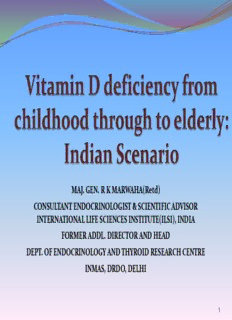
Vitamin D deficiency from childhood through to elderly PDF
Preview Vitamin D deficiency from childhood through to elderly
MAJ. GEN. R K MARWAHA(Retd) CONSULTANT ENDOCRINOLOGIST & SCIENTIFIC ADVISOR INTERNATIONAL LIFE SCIENCES INSTITUTE(ILSI), INDIA FORMER ADDL. DIRECTOR AND HEAD DEPT. OF ENDOCRINOLOGY AND THYROID RESEARCH CENTRE INMAS, DRDO, DELHI 1 Introduction Vitamin D is an important hormone necessary not only for maintaining calcium balance and safeguarding skeletal integrity but also essential for overall health and well being. It is primarily acquired by exposure to sunlight and food articles commonly consumed by Indians do not provide adequate vitamin D. No food articles are adequately fortified in India. Nutritional rickets and vitamin D deficiency continues to exist as a major health problem in India. 2 Cont.. The most sensitive index in assessing vitamin D status is 25(OH)D (Hollis BW Calcif Tissue Int; 1996; 58; 4-5). Age, sex, pubertal status, latitude, season, race, pollution and ethnicity influence 25(OH)D levels. Approximately 40-50% of total skeletal mass at maturity is accumulated during childhood and adolescence. (Mora et al, 1999; Cadogan et al, 1998) Life style determinants - exercise, body composition, nutrition, calcium and Vitamin D intake affect bone development. Peak bone density is attained by 3rd decade. 3 Role of Vitamin-D in our health It maintains blood calcium level in normal range which is vital for normal functioning of nervous system, bone growth and achieving peak bone density. It is a potent immune system modulator and prevents development of respiratory infections like infuenza virus and autoimmune disorders. It inhibits uncontrolled proliferation and stimulates differentiation of cells thereby preventing common cancers. Plays a role in insulin secretion under conditions of increased insulin demand. Whiting J S and Calvo S M American Society of Nutritional Sciences, 2005 4 Why Sound Bone Health? Poor bone health is responsible for causation of 8.9 million Fractures annually worldwide. Life time risk for hip, vertebral and wrist fracture is 30- 40%. High morbidity and mortality associated with osteoporotic fractures. Projected Number of 0 5 2 3 Projected to reach Osteoporotic Hip Fractures 3.250 million in Asia by 2050 Worldwide 8 2 6 4 6 7 Total number of 0 9 0 2 4 hip fractures: 8 6 7 3 0 0 1950 = 1.66 million 6 2050 = 6.26 million 1950 2050 1950 2050 0 1950 2050 0 1 1950 2050 Estimated number of hip fractures: (1000s) Adapted from C. Cooper et al, Osteoporos Int. 1992; 2:285-9 All Fractures are Associated with Morbidity Unable to carry out at least one independent activity of daily living 80% Unable to walk independently Permanent 40% disability Death within one year 30% 20% Cooper C., Am J Med. 1997; 103(2A):12s-19s 8
Description: